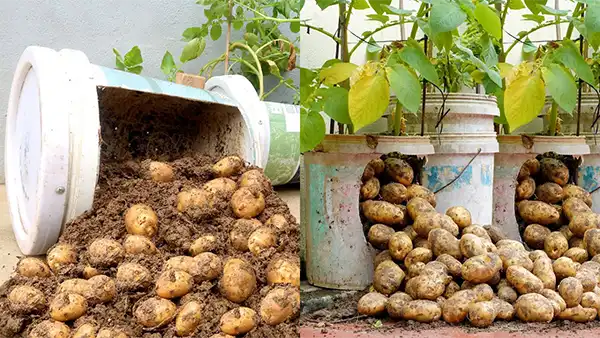Homemade Fertilizers for Thriving Container Potato Growth

Growing potatoes at home in containers is a rewarding endeavor that allows you to enjoy the delights of fresh, homegrown produce even with limited garden space. To ensure a bountiful potato harvest, it’s crucial to provide your plants with the right nutrients. While store-bought fertilizers are readily available, making your own homemade fertilizers can be both cost-effective and environmentally friendly. In this article, we’ll explore various homemade fertilizer options tailored to promote optimal potato growth in containers.

1. Compost Tea: Compost tea is a nutrient-rich liquid fertilizer derived from steeping compost in water. To make compost tea, fill a bucket with water and add a generous amount of well-aged compost. Let the mixture steep for a few days, stirring occasionally. Strain the liquid and dilute it with water until it’s the color of weak tea. Use this mixture to water your potato plants. Compost tea provides a balanced blend of macro and micronutrients, enhancing soil structure and supporting healthy potato growth.
2. Banana Peel Solution: Banana peels are a fantastic source of potassium, a vital nutrient for promoting robust potato yields. To create a banana peel solution, chop up a few banana peels and soak them in water for a week. Strain the liquid and use it as a potassium-rich fertilizer. Potassium helps strengthen plants, improve tuber development, and increase resistance to diseases and stress.
3. Epsom Salt Spray: Magnesium is another essential nutrient for potato growth. Epsom salt, which is magnesium sulfate, can be applied as a foliar spray to help prevent magnesium deficiency. Dissolve a tablespoon of Epsom salt in a gallon of water and spray the solution onto the leaves of your potato plants. This method ensures efficient magnesium absorption and promotes healthy foliage, leading to improved photosynthesis and tuber development.
4. Fish Emulsion: Fish emulsion is a potent organic fertilizer that provides a boost of nitrogen, phosphorus, and trace minerals. It’s a byproduct of the fish-processing industry and can be purchased or made at home. To make your own fish emulsion, blend fish scraps (like fish heads and bones) with water until it forms a thick slurry. Let the mixture ferment for a few weeks, then strain the liquid. Dilute the fish emulsion with water and use it to nourish your potato plants, encouraging lush growth and ample tuber formation.
5. Coffee Grounds Mix: Used coffee grounds are a valuable source of nitrogen and organic matter. Mix coffee grounds with your soil or compost to enhance nutrient content and improve soil structure. The gradual release of nitrogen from coffee grounds supports steady potato growth and foliage development.
6. Eggshell and Coffee Grounds Mix: Eggshells are an excellent source of calcium, which is essential for preventing blossom end rot in potatoes. To create a nutrient-rich blend, crush cleaned eggshells into small pieces and mix them with used coffee grounds. This mixture not only adds calcium to the soil but also provides nitrogen from the coffee grounds. Sprinkle this mixture around the base of your potato plants to fortify their structural integrity and minimize the risk of calcium-related disorders.
7. Wood Ash Fertilizer: If you have a fireplace or wood-burning stove, wood ash can be repurposed as a homemade fertilizer. Wood ash is rich in potassium and contains trace amounts of other minerals. However, it’s important to use wood ash in moderation, as excessive application can raise soil pH to undesirable levels. To use wood ash as a fertilizer, sprinkle a thin layer around your potato plants and gently incorporate it into the soil. This provides a natural source of potassium and also helps regulate soil pH, creating optimal conditions for potato growth.
If you need help with growing potatoes at home in containers, here is a quick guide.
Conclusion: Expanding your knowledge of homemade fertilizers can significantly contribute to the success of your container potato garden. By incorporating ingredients such as eggshells and coffee grounds for calcium and nitrogen, and wood ash for potassium and pH regulation, you can further enhance the nutrient profile of your soil. These additional homemade fertilizer options complement the existing methods of nourishing your potato plants, offering a well-rounded approach to fostering healthy growth, vigorous foliage, and a bountiful harvest. As you experiment with these various homemade fertilizers, you’ll discover the perfect formula that caters to your container potato garden’s unique needs, ultimately leading to a rewarding and satisfying gardening experience.
Do you like this? Share inspiration with your friends!
Source: https://og-oasis.com
DISCLAIMER: THIS WEBSITE DOES NOT PROVIDE MEDICAL ADVICE The information, including but not limited to, text, graphics, images and other material contained on this website are for informational purposes only. The purpose of this website is to promote broad consumer understanding and knowledge of various health topics. It is not intended to be a substitute for professional medical advice, diagnosis or treatment. Always seek the advice of your physician or other qualified health care provider with any questions you may have regarding a medical condition or treatment and before undertaking a new health care regimen, and never disregard professional medical advice or delay in seeking it because of something you have read on this website.
